
Summer
is coming, and we look forward all together. A bike ride with
friends, a trip to the sea with the (grand) children, a barbecue with
the family, yes, even a hefty scrubbing of the garden terrace. It's
so much fun at a fine weather. But what if the clapper pass and a
real heat wave replaces that blissful summer breeze? Being alert is
the message. Dehydration, heat stress or heat stroke can occur. San
Cooreman - Family Assistance provides help in the heat!
5 in a row
The
Royal Meteorological Institute (RMI) speaks of a heat wave when at
least five consecutive days reach at least 25 degrees. At least three
of them, the temperature is 30 degrees or more. If this is the case,
then the RMI sends a warning from heat in the media. That almost
always accompanied by a warning to ozone peaks.
Risk
groups
Children,
people over 65 and people suffering from chronic illness are at risk
at extreme temperatures
Children,
people over 65 and people with chronic illnesses such as asthma or
diabetes, should be careful in extreme temperatures. Children are
more sensitive to heat because they can not properly regulate their
body heat. As you get older one day, this power will be reduced
again. In addition, older people are less thirsty incentives and they
therefore often do not drink enough. In chronically ill some
medications can increase the risk of dehydration. Note, too young
(er) healthy people can get difficult to heat. Prevention is so
important to us all.
How do you recognize dehydration, heat stress or heat stroke?
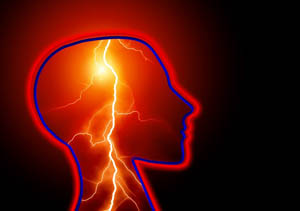
Headaches,
cramps in your stomach or arms, and exhaustion are signs of
dehydration or heat stroke. Take Immediately Action!
Speaking
of dehydration when you no longer have enough water in your body.
When heat stress or heat stroke affects your body overheat and fail
you not to cool yourself. Symptoms of overheating, you should always
take seriously. Especially at risk can occur very rapidly , cause
severe complications. A heat stroke can even be fatal.
Do
you recognize in yourself or someone else one or more of the
following symptoms, then grab immediately:
Dry
mouth, excessive thirst, headache ... This indicates dehydration.
Cramps
in the abdomen, arms or legs.
Exhaustion:
dizzy, weak and weary, a rapid pulse or possibly lose consciousness.
Correct
intervention is done by moving the person out of the sun and / or
removing the heat and bring to a cool place. Let him drink water,
refresh with a damp cloth. Call a physician.
Prevention is better than cure: 5 Tips
A
heat wave calls for common sense. We all have. With these tips, you
can also protect yourself adequately:
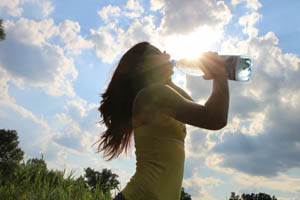 Drink
regularly even if you are not thirsty. Water remains the best
choice. Alcohol, coffee and sugary soft drinks are not suitable. Did
you know drink does drink? A useful tip if one of your roommates
should drink more. Set a good example.
Drink
regularly even if you are not thirsty. Water remains the best
choice. Alcohol, coffee and sugary soft drinks are not suitable. Did
you know drink does drink? A useful tip if one of your roommates
should drink more. Set a good example.
- Eat enough, even if you feel less hungry by the heat. Eating fruit is a good idea. It always tastes.
- Provide cooling and refreshment. Try to keep the heat out of the house by using proper sun protection. Wear light cotton clothing. Refresh your forehead with a damp cloth. Take a refreshing shower.
- Take it easy during heat peaks. Live at a slower pace: a siesta can! Avoid (heavy) exercise. Did you have anything planned? Suppose then off to the greatest heat is over.
- Stay out of the sun. Should you still go out, go for shady spots. Sun cream and wear a hat and sunglasses.
Caregivers are alert
Drink
and eat enough, even if you are not thirsty or not feeling hungry.
Water and fruit are an absolute must!
Did
you know that nursing homes have a heat protocol? In it they describe
the actions they take in extreme heat for residents. Also in family
caregivers to be alert. For example, for example, caregivers and
domestic workers of Family Assistance ensure that their clients
drinking enough or they provide some cooling off with a refreshing
foot bath.
Summer Excursion with your grandchildren? So you keep it safe!
Even
on days when the temperature not provides worrying peaks, keep it
safe in the sun. Some tips:
Plan
your trip so that you are in the heat of the day (within) have
shelter.
Choose
as much as possible for a spot in the shade.
Lubricate
your sunblock with a high protection factor. Repeat regularly, even
if you're playing or in the shade.
Wear
light cotton clothing. Protect your head with a hat or sun hat and
wear sunglasses with good UV filter. The eyes of small children must
be protected.
Drink
plenty of water. A water ice is a good idea to get extra moisture.
Your grandchildren will love this too!
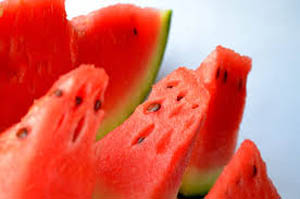
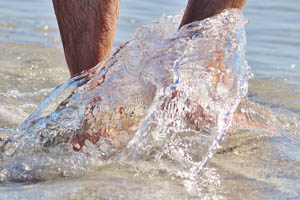
A
contribution from hits _universe as a translation from San Cooreman,
manager marketing and communication of Familiehulp
(www.familiehulp.be).
See our social presence at: XeeMe.com/Hits-Universe-Group
Join us at : http://xeeme.com/?r=zqeJBZG$U0V*

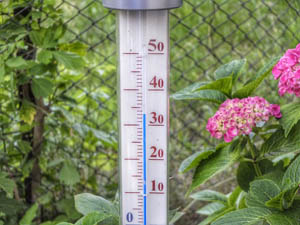
No comments:
Post a Comment